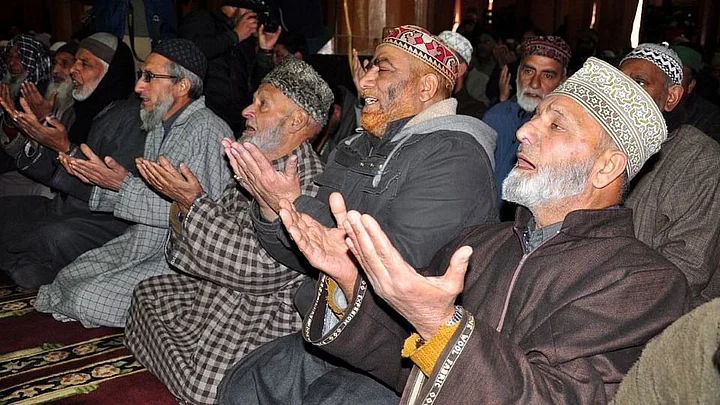The Jammu and Kashmir (J&K) administration said on Wednesday, 27 April, that the last congregational prayers of Ramadan on Friday would be disallowed at Srinagar's historic Jamia Masjid.
The news was conveyed to the Anjuman Auqaf Jamia Masjid, which is the grand mosque's managing body, on Wednesday night.
"It has been conveyed that the Jumat-ul-Vida (the last Friday prayers of Ramadan) and Shab-e-Qadr (night prayers on the 27th night of Ramadan) would not be allowed at the grand mosque," said the secretary of the masjid, Altaf Ahmad Bhat, as per a report by The Indian Express.
While the Shad-e-Qadr falls on Thursday, the Jumat-ul-Vida prayers fall on Friday. During the former, Muslims stay awake and pray, while the latter marks the largest congregation in the mosque, with over 1 lakh attendees.
A statement by the mosque's managing body also said that it "strongly denounces this decision of the authorities."
The state's police said that the decision to disallow the prayers was taken as they may not be able to handle such a large congregation.
"Traditionally, it is a huge congregation and it can easily spiral into an azadi protest. It would be difficult for us to manage such a huge congregation," a police officer was quoted as saying by The Indian Express.
Opposition Parties Denounce Move
Meanwhile, the move was denounced by a number of Opposition parties in the state, most prominently the People’s Alliance for Gupkar Declaration (PAGD).
"The authorities, according to reports, have asked the managing body of the Jamia Masjid, not to offer prayers on Shab-e-Qadar and Jumat-ul-Vida, the last Friday of the holy month of Ramadan. The move will bar thousands of people from offering the congregational prayers inside the historic mosque," said alliance spokesperson and Communist Party of India (Marxist) leader MY Tarigami, as per a report by PTI.
Tarigami also said that the move led to direct interference in religious matters, and was thus unacceptable. He also urged the administration to rethink its decision. "Such moves tantamount to hurting the religious sentiments of the people."
'Artificial Normalcy Exists in Kashmir': NC Leader Omar Abdullah
Former J&K Chief Minister and National Conference (NC) leader Omar Abdullah also said that the ban on congregational prayers was "unfortunate," adding that the administration was attempting to create "artificial normalcy" in the erstwhile state.
"That is unfortunate. They say that the situation is almost normal. If it is normal, then why no permission to Shab and Jumait-ul-Vida (prayers) in Jamia Masjid?" Abdullah said while speaking to the press.
He also added that normalcy would not come only through the means of tourism, but by letting people lead normal lives. "Not having the prayers is evidence of an abnormal situation, and not normalcy. The government, if not by its words, then by its actions, is proving that the situation in Kashmir is far from normal."
'Outrageous': Hurriyat Slams Decision
Meanwhile, the separatist Hurriyat Conference, led by Mirwaiz Umar Farooq, also slammed the decision, calling it "outrageous."
"Not allowing congregational prayers on the occasion of Jumat-ul-Vida at the central Jamia mosque of the valley, which is thronged by lakhs of valley’s Muslims on this blessed day - when offering prayers at Jamia Masjid has greater blessings, is outrageous, and against the fundamental human right to religious practice," the organisation said in a statement.
The mosque has been a stronghold of the Hurriyat. However, its leader Mirwaiz Umar Farooq had been in house detention since the abrogation of Article 370 in the state, and was not allowed to give a sermon at the Jamia Masjid.
(With inputs from PTI and The Indian Express.)
